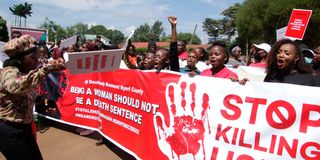Femicide: Should we ask women, girls to start their own village to be safe?

Women's rights activists and residents of Nyeri join a procession in Nyeri town to protest against the rise in femicide in the country. Feminists held a nationwide protest dubbed ‘Feminists March Against Femicide’ on Saturday, January 27, 2024.
What you need to know:
- Too many Kenyans seem to have lost sight of our shared humanity, caught up in a debate about the very term itself.
- There's a clamour in certain circles for an equivalent term for men, as if this was a competition on death.
- My concern is that amidst this terminology dispute, we might lose sight of the real issues.
I hadn't planned on delving into the topic of femicide this week, but it's becoming increasingly challenging to stay silent.
Too many Kenyans seem to have lost sight of our shared humanity, caught up in a debate about the very term itself.
There's a clamour in certain circles for an equivalent term for men, as if this was a competition on death.
My concern is that amidst this terminology dispute, we might lose sight of the real issues.
In an X (Twitter) Space held last week by the Nation, aptly titled “How we can stop the #Femicide madness”, what was intended to be a level-headed, solutions-focused discussion turned into a skirmish between those advocating for the boy child and feminists.
The moderators must have felt more like referees in a bullfight than facilitators at some point.
I tuned out after hearing enough but not before making this point: Death doesn't discriminate based on gender, and those of us speaking out about femicide are aware of this fact.
However, when murder cases disproportionately affect one gender, especially through gender-based violence (GBV) and sexual and gender-based violence (SGBV), we need a different conversation because women and girls suffer in the most violent ways.
Femicide by any other name is still femicide, and anyone who believes in human rights should stand by this.
It's not about a gender battle or comparing statistics on male versus female deaths. It's about speaking up against a deadly vice as human beings who believe all lives are sacred.
What impunity portends
If we don't speak up now, we might end up joining the ranks of Mexico, where research reports indicate over 3,000 women are murdered every year, with activists claiming that 50 per cent of these murders qualify as femicide.
Additionally, sexual crimes against girls have been on the rise, and the overall impunity rates are around 95 per cent.
One speaker in the X Space lamented how everything, including death, “has to be compared to men and boys, sometimes at the expense of men and boys”.
The self-proclaimed advocate of the boy child added that young women must stop reckless, immoral behaviour like meeting strangers at short-stay accommodations.
Advising women to take precautions for their safety is entirely acceptable; we even have courses for this.
What's appalling about this advice is not just that it borders on victim-shaming; it's also that these heinous crimes sometimes occur within the safety of people's homes.
Should we ask women and girls to start their own village so that they can be safe?
The point is that as we educate women to protect themselves, let's also expend the same energy to educate men to stop killing women.
Away from the arguments about the lexicon, femicide is not just a woman's issue.
We all bear the brunt of grief when femicide occurs, regardless of our gender. It affects everybody.
The writer comments on social and gender topics (@FaithOneya; [email protected]).





